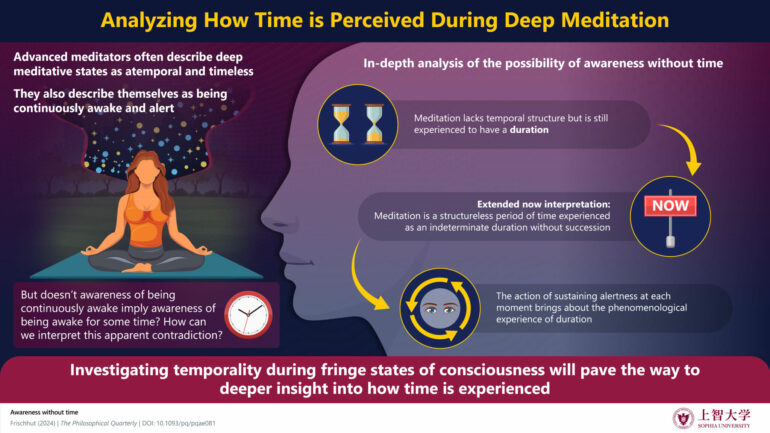Accounts of people describing deep meditation often present such states as “pure consciousness experience” which feel alert yet are practically devoid of any content other than “awareness itself.” In general, these states are described as timeless, suggesting a loss of the notion of time and other aspects of temporal phenomena, including concepts such as the past and future. But if one is aware of being consciously awake and alert, shouldn’t one also be aware of being awake for some time? Can deep meditative states be truly timeless?
In an article published in The Philosophical Quarterly on July 23, 2024, Assistant Professor Akiko Frischhut from Sophia University, Japan, analyzes this apparent contradiction.
“My paper aims to give a coherent conceptualization of deep meditative states, focusing in particular on phenomenal temporality during meditation,” she explains, “The central question is whether it is possible to have an experience that is completely timeless, without any temporal feature whatsoever.”
Thomas Metzinger has recently shown that first-person-perspective accounts of deep meditation states, ranging over a wide variety of cultures and epochs, describe these states in interestingly similar ways. One feature that meditators seem to agree on is that deep meditative states seem on the one hand “completely timeless” and on the other “continuously ongoing.”
However, if something is “ongoing,” then it must go on for some time, and thus cannot be completely timeless. To interpret this apparent contradiction is the goal of this article. The author argues that we can resolve the apparent contradiction in the reports when we assume that deep meditative states must necessarily be experienced as having at least one minimal temporal feature: duration.
To support this idea, Dr. Frischhut puts forth what she dubbed the “Extended Now Interpretation (ENI).” She argues that there is an ambiguity in the use of the word “timeless,” such that descriptions of deep meditative states as “timeless” are actually compatible with meditative states being experienced as having indeterminate duration, i.e., as “going on for some time,” but without any temporal structure such as change, order, succession, beginning, or end. Due to the perceived lack of temporal structure, meditators describe the state as “timeless,” even though it has a duration.
The author shows that the word “timeless” is sometimes used in the sense of completely atemporal but also sometimes in the sense of “duration without structure.” It is the latter sense that renders the reports coherent. According to ENI, deep meditation occurs over an interval that the person perceives as an extended present, with no awareness of change, succession, temporal order, beginning, or end. Thus, “timelessness” refers to a lack of temporal structure but not a lack of duration.
Dr. Frischhut’s analysis moves on to exploring how sustaining alertness may just be what makes meditators implicitly aware of duration, even when immersed in a state where temporal references don’t exist. Alertness as found in deep meditation may be described as poised attention or, at the very least, a condition for attention. As time goes on, a meditator can either stay alert or “doze off” into a less attentive state.
Since the option of staying alert or not presents itself anew for each passing moment, the meditator is aware of time passing, and thus aware of a period of time, Dr. Frischhut argues. This does not require the meditator to consciously keep track of a succession of moments, as maintaining alertness during meditation may be enough to give them an awareness of duration even without an awareness of succession.
Finally, Dr. Frischhut addresses the fact that meditators report having no access to memory during deep meditative states, which would present a problem to her argument. She proposes that the experience of being alert at any given moment has a particular phenomenological character that would be different had it not been preceded by an essentially identical experience of alertness.
Discover the latest in science, tech, and space with over 100,000 subscribers who rely on Phys.org for daily insights.
Sign up for our free newsletter and get updates on breakthroughs,
innovations, and research that matter—daily or weekly.
This can be thought of in a more intuitive way in how a second knock on a door wouldn’t be experienced the same without the first knock. Thus, even without engaging memory, a meditator still experiences duration in the form of instances of momentary alertness that each flows seamlessly from a previous one.
Overall, this article provides an interesting take on deep meditation that could help us make sense of what has been reported time and time again over the history of humankind. Dr. Frischhut, who has been fascinated by unusual states of consciousness throughout her career, hopes her analysis stirs up discussions in this relatively unexplored area.
“In my opinion, non-ordinary states of consciousness such as deep meditative states, dreams, and psychedelic states have not been sufficiently investigated in contemporary philosophy,” Dr. Frischhut comments.
She suggests that investigating phenomenal temporality in these fringe states of consciousness could provide deeper insight into how time is experienced and, from a broader perspective, the inner workings of our minds.
More information:
Akiko Frischhut, Awareness without time, The Philosophical Quarterly (2024). DOI: 10.1093/pq/pqae081
Citation:
Awareness without time? A deep look into timelessness in deep meditative states (2024, December 11)



